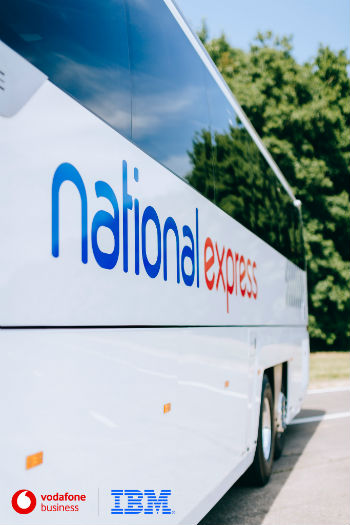Hybrid Cloud
It’s a Long and Open Road Ahead for Bus & Coach Travel
November 13, 2019 | Written by: Debbie O'Shea
Categorized: Hybrid Cloud | Hybrid Multicloud | IBM Cloud | Transportation
Share this post:
 As one of the oldest forms of public transport, the bus occupies a special place in our hearts and lives. For more than a century, these vehicles have carried us to work, school, holiday destinations and festivals.
As one of the oldest forms of public transport, the bus occupies a special place in our hearts and lives. For more than a century, these vehicles have carried us to work, school, holiday destinations and festivals.
But bus and coach companies can hardly afford to be sentimental nowadays. Technological innovations are creating new models of mobility which are radically changing the way we travel from A to B. Today’s travelers have a myriad of transportation options beyond the venerable bus or coach – from planes, to trains, to car-sharing. And they no longer stay loyal to one option, but swipe between apps to blend several choices into one “seamless” journey.
At National Express, we recognise we have an important role in ensuring that bus and coach travel remains an important option in the mobility systems of the future.
We operate bus, coach and rail services in the U.K., Continental Europe, the U.S. and several other countries, and in 2018 enabled 898 million journeys around the world. Our mission is to provide our passengers with value transportation services in the most safe and reliable way possible.
As CIO, my job is to ensure technology and innovation are front and center in our transformation. Like most of my peers, my challenge is to turn a vast array of solutions and innovations into a seamless customer experience. That’s why we were quick to recognise the recent partnership and new venture between IBM and Vodafone Business provided us with a unique opportunity.
By bringing together cloud, high-speed connectivity and AI all under one roof, the Vodafone Business & IBM venture is a compelling proposition for a company like ours. With a firm commitment to open technologies, the venture understands that established companies like National Express don’t want to jump feet-first into the public cloud. While we want to benefit from all the cloud has to offer, we prefer to keep some of our most mission-critical data and processes running on our own data centres. Nor do we want to hem ourselves into one public cloud service, but rather have the ability to build apps that can run on multiple clouds, regardless of location or vendor.
Working with the Vodafone Business & IBM venture to move our U.K. business operations to a hybrid cloud environment will help us with the digital transformation we already have well under way. This new platform will provide the flexibility we need to easily incorporate a mix of forward-looking technologies such as AI-powered analytics, IoT, edge computing and 5G-supported services.
Our business priorities are grounded in the evolving needs of our passengers. A good example comes from our operations in the west-central area of England, known as the West Midlands. In order to attract younger and tech-savvy passengers, we invested heavily in a consumer-facing digital payment system, which has become one of the largest deployments of contactless technology on vehicles outside of London. The investment paid off: 64 percent of all of our revenue is now collected through digital means on transport in the West Midlands region, compared to five percent two years ago.
As well as being more convenient, this technology has allowed us to introduce a fare-capping model to entice passengers to make more journeys. Using an advanced fare-payment system, we are able to count how often a passenger rides a bus within a set period and stop charging after they reach the cost-equivalent of a regular daily pass. The setup lets customers travel flexibly without worrying about paying more.
Cloud and connectivity support those mobile application transactions. They’ll also support future innovations like Neon, our proof-of-concept ride-sharing service which runs coach vehicles to events based on demand. Once enough people have requested a ride to a concert, festival or other type of gathering, we’ll provide the service. By pooling passengers, we’re also reducing vehicle emissions.
Having a flexible cloud platform based on container technologies, makes it easier to integrate with other systems as we expand our operations. This year, National Express bought a majority share in WeDriveU, a U.S. transportation service that specialises in shuttles for universities and Silicon Valley corporations; WeDriveU has some innovative services which we will look to develop in new territories.
For us, success isn’t defined only by revenue; we strive for operational excellence with the safety of passengers being our number one focus. To that end, we’ve placed smart cameras on our vehicles. By referencing the video and associated telematics data on vehicle speed and other aspects of travel, we can offer detailed feedback to drivers – such as a reminder to soften turns or avoid a particular route.
5G and edge computing offer huge opportunities; such technology will help us to better manage and connect our vehicle fleet so that we can optimise routes and offer richer, more personalized digital experiences to our passengers. And although it’s a destination further down the road, cloud and super-fast connectivity allow us to keep an eye on the potential of autonomous vehicles.
While becoming a more digitalised, personalised and interconnected business opens exciting new possibilities, it also places huge emphasis on our security and privacy protocols. Safeguarding and respecting the personal data of our millions of customers is of paramount importance; as well as ensuring that our fleet of vehicles is protected against the risk of a cyberattack. A hybrid cloud approach enables us to strike a healthy balance between growth, innovation, security and trust.
With the Vodafone Business & IBM venture working alongside other trusted partners, National Express is confident that it can deliver affordable, safe, flexible, reliable and sustainable transport solutions into the future.

Group CIO. National Express
How a Hybrid Multicloud Strategy Can Overcome the Cloud Paradox
Public clouds have a lot to offer. Public clouds bring about agility, elasticity, and speed, which make a company’s IT shop become a lot more responsive to the needs of its business. By shifting workloads to the cloud, businesses can make great strides in reducing costs and boosting productivity. This allows them to focus on […]
The 3 Beachheads of AI
(Part 2 in a Series) We have been partnering with and assisting clients on their data needs and strategies for years. It’s clear that data and AI are two-sides of the same coin; in fact, this understanding spawned the AI Ladder concept. We’ve developed skills training in the areas of data science and machine learning; […]
City ‘Congestion Pricing’ Helps Commuters Out of a Jam
More people than ever are living and working in cities – and that’s becoming a problem. All those people need to get around, and our transit systems, after years of underinvestment, can’t handle the load. Frustrated by poor service, more people are opting to drive instead, or take an Uber or Lyft. The result? Traffic, and […]


